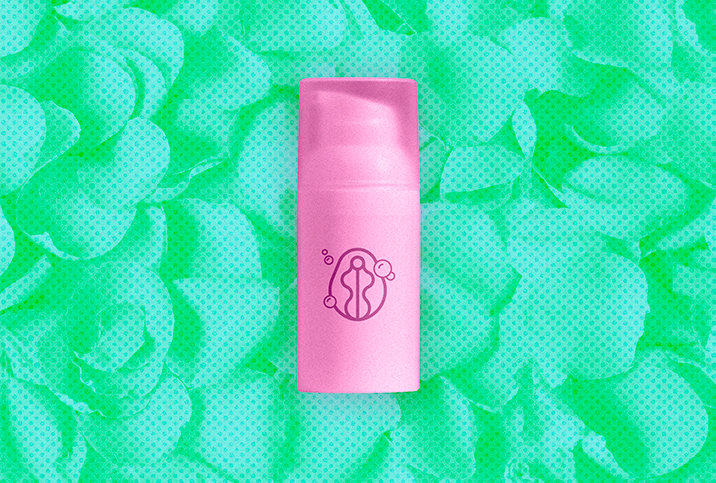Stop Saying Vagina When You Really Mean Vulva

"Are you ready to talk about vaginas?" Gwyneth Paltrow asked in episode 3 of Netflix's "The Goop Lab." Determined to make Paltrow's error into a teachable moment, the late prolific sex educator Betty Dodson quickly set the facts straight.
"The vagina's the birth canal only," Dodson asserted firmly. "You want to talk about the vulva, which is the clitoris and the inner lips and all that good s$%t around it."
Surprised and slightly embarrassed by her apparent lack of knowledge, Paltrow followed the explanation by admitting she thought "the vagina was the whole [thing]" and has always referred to it as such. And that, it turned out, was one of Dodson's pet peeves.
As I listened to Paltrow, the owner of a successful, albeit controversial, wellness and lifestyle brand for women, make such a simple mistake about female anatomy—one I'd heard over and over again—I immediately wondered how many vulva owners had the same misconception. And why didn't I ever hear anyone actually use the word "vulva"?
Why didn't I use it myself?
Then an alarming statistic appeared on my screen while watching Goop: "In 2016, Eve Appeal, a U.K. gynecological cancer charity, asked 1,000 women to identify their anatomy in a medical illustration," it read. "Forty-four percent of women were unable to identify their vagina. Sixty percent of them were not able to label their vulva."
Further research revealed that in a 2020 poll of 2,000 American women, commissioned by INTIMA and conducted by OnePoll, nearly 1 in 4 misidentified the vagina, while 46 percent couldn't properly identify the cervix. And in 2019, the U.K. newspaper The Guardian reported that a whopping 73 percent of women didn't technically know what a vulva is, according to research by Bodyform.
A lack of proper education
"I don't recall learning anything other than to cover up," said Esther Hunter, a 30-year-old who admits she "know[s] barely anything" about female anatomy. "I didn't learn its name, I didn't learn about any of the separate parts. I was brought up to know nothing about it except to save it for my husband for marriage."
Hunter was married to a man for five years before she came out as gay, got divorced and became engaged to a fellow vulva owner. She said her lack of education when it comes to pleasure and her body has prevented her from being able to express her needs and advocate for herself during sex.
"Being able to ask for what feels good first requires having a preference," she added. "For those of us who were told our parts were dirty, embarrassing or even sinful, shame causes us to repress."
A lack of proper sex education has left many in the dark when it comes to their sexual anatomy and pleasure, explained Isabelle Uren, a certified sex expert and site manager for sex-positive website Bedbible.com.
'Due to the stigma attached to sexual pleasure, the vulva has largely been left out of the conversation.'
The result? Multiple generations of women, nonbinary and trans people who can't correctly identify their genitals, aren't familiar with their most intimate parts and are incapable of speaking openly with sexual partners about what it is that turns them on.
"The majority of sex education has been taught from a cisgender, gender binary, heterosexual perspective with a focus on reproduction," Uren said. "So the vagina—the inner canal involved in penis-in-vagina sex, conception and childbirth has been the primary focus.
"Due to the stigma attached to sexual pleasure, the vulva has largely been left out of the conversation," she added. "This repressive and exclusionary view has warped our understanding of our anatomy and neglected the experiences of all the people who don't fall into those categories."
Uren also noted that the limited range of sexuality to which we all are exposed in both the media and society as a whole also leads to massive gaps in knowledge that can result in internalized shame when we differ from what's shown to be "normal."
We still have a long way to go
We've come a long way from where we once were, and the fact that the word "vagina" has been normalized is something to celebrate. After all, there was a time not too long ago when euphemisms (think vaj, vajayjay, coochie, hoo-haw, lady business and many more) were the only acceptable ways to refer to female genitalia in public conversation.
Euphemisms are most often used in discussions about subjects that society judges as taboo. Uren noted that when we use those euphemisms to talk about sex and genitals, it only reinforces the idea that sex is a taboo subject and perpetuates those feelings of shame.
But while this progress away from euphemisms shouldn't go unacknowledged, labeling all female genitalia as "the vagina" devalues vulva owners' sexual experience, according to sex counselor Dr. Lori Davis.
"Focusing on the vagina as women's primary sexual organ prioritizes penetrative sex, even though most women do not orgasm from penetrative sex alone," Davis explained. "Just using the vagina to refer to all female sex organs harkens back to the old Freudian idea that women should have vaginal orgasms if they are really 'mature' and not childishly focused on their clitorises. But for most women, the vulva is where the sexual action is, as the vulva includes the glorious clitoris."
The vagina has also become the stand-in word for all female genitals because, quite simply, the vagina is what has mattered to men, Davis added. Men's pleasure is most closely tied to vaginal sex, and men's experience of women's bodies has long defined how they are portrayed and understood in our culture.
Using the word 'vulva' when you mean vulva and 'vagina' when you mean vagina empowers women and is a subtle jab at the patriarchy.
This continued focus on men's pleasure has resulted in what's known as the pleasure gap—which refers to the disparity in pleasure heterosexual cis women experience compared to their cis male partners.
Alexandra Fine is the founder and CEO of Dame, an inclusive sex toy company with a mission to close the pleasure gap once and for all, and she clarified that vulva owners must get to know their bodies and dare to speak freely about these so-called taboo topics—and using the right words—if that goal is ever to be achieved.
"The more we discuss these topics openly, the less power is given to the harmful narrative of feeling ashamed or embarrassed by a very human experience that actually benefits your health," she added.
In fact, Davis said that using the correct terminology when talking about our bodies has more wide-ranging impacts than many of us may even realize.
"Using the word 'vulva' when you mean vulva and 'vagina' when you mean vagina empowers women and is a subtle jab at the patriarchy," Davis explained. "Even if you aren't interested in smashing the patriarchy with your word choices, using more precise words supports communication with your sexual partner, allowing you to ask precisely for what you want and increasing the odds that you will get it."


















